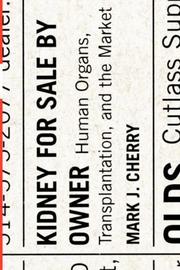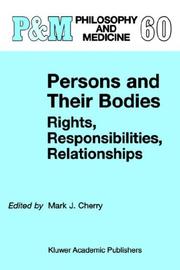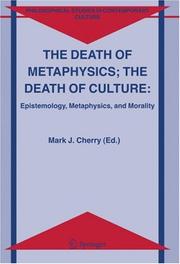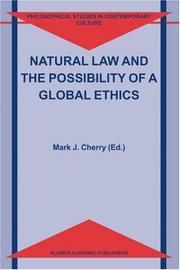| Listing 1 - 10 of 32 | << page >> |
Sort by
|

ISBN: 158901040X 162616293X 1589013557 Year: 2005 Publisher: Washington, D.C. Georgetown University Press
Abstract | Keywords | Export | Availability | Bookmark
 Loading...
Loading...Choose an application
- Reference Manager
- EndNote
- RefWorks (Direct export to RefWorks)
"Kidney for Sale by Owner contends that the market is indeed a legitimate - and humane - way to procure and distribute human organs. Cherry stakes the claim that it may be even more just, and more compatible with, many Western religious and philosophical traditions than the charity-based system now in place. He examines arguments against a market for body parts, including assertions based on the moral views of John Locke, Immanuel Kant, and Thomas Aquinas, and shows these claims to be steeped in myth, oversimplification, and contorted logic."--Jacket.
Medical law --- Professional ethics. Deontology --- United States --- Procurement of organs, tissues, etc. --- Transplantation of organs, tissues, etc. --- Economic aspects --- Moral and ethical aspects --- Transplantation --- Transplants --- Tissue and Organ Procurement. --- lichaamsmateriaal (lichaam, menselijk lichaamsmateriaal) --- commercialisering van het menselijk lichaam (orgaanhandel) --- Donor Cards --- Organ Donation --- Required Organ Donation Request --- Required Request --- Tissue Donation --- Organ Procurement --- Organ Procurement Systems --- Tissue Procurement --- Card, Donor --- Cards, Donor --- Donor Card --- Organ Donations --- Organ Procurement System --- Organ Procurements --- Required Requests --- Tissue Donations --- Tissue Procurements --- Tissue and Organ Harvesting --- Medical transplantation --- Organ transplantation --- Organ transplants --- Organs (Anatomy) --- Surgical transplantation --- Tissue transplantation --- Tissues --- Transplants, Organ --- Surgery --- Preservation of organs, tissues, etc. --- Organ procurement (Surgery) --- Tissue procurement (Surgery) --- Tissue banks --- ethics. --- economics. --- matériel corporel humain, (corps humain) --- commercialisation du corps humain (commerce d'organes) --- Procurement of organs, tissues, etc --- Transplantation of organs, tissues, etc --- Tissue and Organ Procurement --- ethics --- economics --- Transplant surgery --- Transplantation surgery --- Organ Shortage --- Tissue Shortage --- Shortage, Tissue --- Tissue Shortages --- United States of America
Book
ISBN: 9048184878 9048123003 9786612364419 1282364413 9048123011 Year: 2009 Publisher: [Dodrecht] : Springer,
Abstract | Keywords | Export | Availability | Bookmark
 Loading...
Loading...Choose an application
- Reference Manager
- EndNote
- RefWorks (Direct export to RefWorks)
Western philosophy has long nurtured the hope to resolve moral controversies through reason; thereby to secure moral direction and human meaning without the need for a defining encounter with God or the transcendent. The expectation is for a moral rationality that is universal and able adequately to frame and guide the moral life. Moral and cultural unity was sought though philosophical reflection on human nature and the basic goods of a properly nurtured and virtuous life—that is, through appeal to what has come to be called the natural law. The natural law addresses permissible moral choice through objective understandings of human nature and human goods. Persons are obligated to act in ways that are compatible with creating and integrating the basic human goods into their lives and the lives of others. Such goods provide the basis for practical reasoning about virtuous choices and immediate reasons for action. The goal is the making of rational choices in the pursuit of a virtuous, flourishing, human life. Natural law theorists have argued extensively against human cloning, abortion, and same-gender marriage. Yet, whose assumptions regarding human nature should guide our understanding of the basic goods that mark the full flourishing human life? Moreover, why should nature, even human nature, be thought of as a moral boundary beyond which one must not trespass? Persons may wish actively to direct human evolution, utilizing the tools of both imagination and biotechnology. Perhaps nature is simply a challenge to be addressed, overcome, and set aside. This volume is a critical exploration of natural law theory.
Naturalism. --- Normativity (Ethics). --- Normativity (Ethics) --- Naturalism --- Philosophy --- Philosophy & Religion --- Ethics --- Ethical norms --- Normativeness (Ethics) --- Philosophy. --- Epistemology. --- Ethics. --- Religion --- Political philosophy. --- Philosophy of Religion. --- Philosophy, general. --- Political Philosophy. --- Political philosophy --- Deontology --- Ethics, Primitive --- Ethology --- Moral philosophy --- Morality --- Morals --- Philosophy, Moral --- Science, Moral --- Values --- Epistemology --- Theory of knowledge --- Psychology --- Mental philosophy --- Humanities --- Materialism --- Mechanism (Philosophy) --- Positivism --- Science --- Genetic epistemology. --- Philosophy (General). --- Political science --- Developmental psychology --- Knowledge, Theory of --- Religion—Philosophy. --- Knowledge, Theory of. --- Moral Philosophy and Applied Ethics.

ISBN: 0792357019 1280043296 9786610043293 0306468662 Year: 1999 Volume: 60 Publisher: Dordrecht ; Boston ; London Kluwer academic publishers
Abstract | Keywords | Export | Availability | Bookmark
 Loading...
Loading...Choose an application
- Reference Manager
- EndNote
- RefWorks (Direct export to RefWorks)
Debate regarding organ sales is largely innocent of the history of thought on the matter. This volume seeks to remedy this shortcoming. Positions for or against a market in human organs are nested within moral intuitions, ontological or political theoretical premises, or understandings of special moral concerns, such as permissible uses of the body, which have a long history of analysis. The essays compass the views of Plato, Aristotle, Aquinas, Locke, Kant, Hegel, Mill and Christianity, as well as particular methodological approaches, such as the phenomenology of the body, natural law theory, legal theory and libertarian critique of legal theory. These discussions cluster a number of conceptually independent philosophical concerns: (1) What is the appropriate understanding of the relationship between persons and their bodies? (2) What does it mean to `own' an organ? (3) Do governments have moral authority to regulate how persons use their own body parts? (4) What are the costs and benefits of a market in human organs? Such questions are related by an urgent public health challenge: the considerable disparity between the number of patients who could significantly benefit from organ transplantation and the number of human organs available for transplantation. This volume explores the theoretical, normative, and historical foundations for alternative policies for procurement and transplantation of human organs.
Human body --- Medical ethics. --- Sale of organs, tissues, etc --- Moral and ethical aspects. --- Biologie humaine -- Morale et aspects éthiques --- Biomedical ethics --- Biomedische ethiek --- Biomédecine -- Morale et aspects éthiques --- Deontologie [Medische ] --- Deontology [Medical ] --- Déontologie médicale --- Ethics [Medical ] --- Ethiek [Medische ] --- Ethique médicale --- Medical care -- Moral and ethical aspects --- Medical deontology --- Medical ethics --- Medicine -- Moral and ethical aspects --- Medische deontologie --- Medische ethiek --- Morale et médecine --- Morale médicale --- Médecine -- Innovations -- Morale et aspects éthiques --- Médecine -- Morale et aspects éthiques --- Médecine et morale --- Politique sanitaire -- Morale et aspects éthiques --- Soins médicaux -- Morale et aspects éthiques --- Éthique clinique --- lichaam --- commercialisering van het menselijk lichaam (orgaanhandel) --- 241.63 --- 17.023.33 --- Body, Human --- -Sale of organs, tissues, etc --- -Organs (Anatomy) --- Selling of organs, tissues, etc. --- Tissues --- Organs (Anatomy) --- Human beings --- Body image --- Human anatomy --- Human physiology --- Mind and body --- Clinical ethics --- Ethics, Medical --- Health care ethics --- Medical care --- Medicine --- Bioethics --- Professional ethics --- Nursing ethics --- Social medicine --- 17.023.33 Biologische doeleinden. Bio-ethiek bioethiek. Übermensch. Medische deontologie --- Biologische doeleinden. Bio-ethiek bioethiek. Übermensch. Medische deontologie --- 241.63 Theologische ethiek: eerbied voor het leven en de waardigheid van de menselijke persoon --- Theologische ethiek: eerbied voor het leven en de waardigheid van de menselijke persoon --- corps --- commercialisation du corps humain (commerce d'organes) --- Moral and ethical aspects --- Sale of --- -Biomedical ethics --- Sale of organs, tissues, etc. --- Philosophy. --- Ethics. --- Ontology. --- Philosophy of Medicine. --- Theory of Medicine/Bioethics. --- 17.023.33 Biologische doeleinden. Bio-ethiek; bioethiek. Übermensch. Medische deontologie --- Biologische doeleinden. Bio-ethiek; bioethiek. Übermensch. Medische deontologie --- Medicine-Philosophy. --- Selling --- Medicine—Philosophy. --- Being --- Philosophy --- Metaphysics --- Necessity (Philosophy) --- Substance (Philosophy) --- Deontology --- Ethics, Primitive --- Ethology --- Moral philosophy --- Morality --- Morals --- Philosophy, Moral --- Science, Moral --- Values

ISBN: 128061160X 9786610611607 1402046219 1402046200 9048171555 9781402046209 Year: 2006 Publisher: Dordrecht Springer
Abstract | Keywords | Export | Availability | Bookmark
 Loading...
Loading...Choose an application
- Reference Manager
- EndNote
- RefWorks (Direct export to RefWorks)
The Latin root of the English word culture ties together both worship and the tilling of the soil. In each case, the focus is the same: a rightly-directed culture produces either a bountiful harvest or falls short of the mark, materially or spiritually. This volume critically explores the nature and depth of our contemporary cultural crisis: its lack of traditional orientation and moral understanding. Prime among the issues at stake are the meaning and significance of birth, copulation, suffering, and death, expressed in debates regarding human embryo-experimentation and stem cell research, the character of moral and scientific norms, as well as more fundamentally, the character of an adequate epistemology for coming to appreciate the deep nature of reality and its normative implications. Given varying background ontological, epistemological, and axiological presuppositions, different moral positions and political objections will appear as not merely morally permissible but as socially and politically obligatory. The volume is addressed to philosophers, theologians, bioethicists and public policy professionals as it critically assesses the increasing void between the traditional Christian metaphysical and moral understandings that guided the flourishing of Christian culture and today’s very secular, and frequently empty, cultural backdrop.
Social ethics. --- Natural law. --- Christian ethics. --- Moral conditions. --- Morals --- Social history --- Social norms --- Ethical theology --- Moral theology --- Theology, Ethical --- Theology, Moral --- Christian life --- Christian philosophy --- Religious ethics --- Law of nature --- Natural rights --- Nature, Law of --- Rights, Natural --- Law --- Ethics --- Social problems --- Sociology --- Social ethics --- Natural law --- Christian ethics --- Moral conditions --- Genetic epistemology. --- Ethics. --- Philosophy (General). --- Philosophy. --- Political science --- Epistemology. --- Philosophy, general. --- Philosophy of Religion. --- Political Philosophy. --- Political philosophy --- Deontology --- Ethics, Primitive --- Ethology --- Moral philosophy --- Morality --- Philosophy, Moral --- Science, Moral --- Philosophy --- Values --- Developmental psychology --- Knowledge, Theory of --- Mental philosophy --- Humanities --- Metaphysics --- God --- Ontology --- Philosophy of mind --- Religion—Philosophy. --- Political philosophy. --- Epistemology --- Theory of knowledge --- Psychology --- Knowledge, Theory of. --- Religion --- Moral Philosophy and Applied Ethics.

ISBN: 1280616741 9786610616749 1402022247 1402022239 Year: 2004 Publisher: Dordrecht : Springer Netherlands : Imprint: Springer,
Abstract | Keywords | Export | Availability | Bookmark
 Loading...
Loading...Choose an application
- Reference Manager
- EndNote
- RefWorks (Direct export to RefWorks)
Accounts of natural law moral philosophy and theology sought principles and precepts for morality, law, and other forms of social authority, whose prescriptive force was not dependent for validity on human decision, social influence, past tradition, or cultural convention, but through natural reason itself. This volume critically explores and assesses our contemporary culture wars in terms of: the possibility of natural law moral philosophy and theology to provide a unique, content-full, canonical morality; the character and nature of moral pluralism; the limits of justifiable national and international policy seeking to produce and preserve human happiness, social justice, and the common good; the ways in which morality, moral epistemology, and social political reform must be set within the broader context of an appropriately philosophically and theologically anchored anthropology. This work will be of interest to philosophers, theologians, bioethicists, ethicists and political scientists.
Natural law --- Ethics. --- Philosophy. --- Philosophy (General). --- Religion. --- Philosophy of law. --- Philosophy, general. --- Religious Studies, general. --- Philosophy of Law. --- Political science. --- Administration --- Civil government --- Commonwealth, The --- Government --- Political theory --- Political thought --- Politics --- Science, Political --- Social sciences --- State, The --- Deontology --- Ethics, Primitive --- Ethology --- Moral philosophy --- Morality --- Morals --- Philosophy, Moral --- Science, Moral --- Philosophy --- Values --- Religion, Primitive --- Atheism --- Irreligion --- Religions --- Theology --- Mental philosophy --- Humanities --- Law --- Moral Philosophy and Applied Ethics.
Book
ISBN: 9781402046216 9789048171552 Year: 2010 Publisher: Dordrecht Springer
Abstract | Keywords | Export | Availability | Bookmark
 Loading...
Loading...Choose an application
- Reference Manager
- EndNote
- RefWorks (Direct export to RefWorks)
The Latin root of the English word culture ties together both worship and the tilling of the soil. In each case, the focus is the same: a rightly-directed culture produces either a bountiful harvest or falls short of the mark, materially or spiritually. This volume critically explores the nature and depth of our contemporary cultural crisis: its lack of traditional orientation and moral understanding. Prime among the issues at stake are the meaning and significance of birth, copulation, suffering, and death, expressed in debates regarding human embryo-experimentation and stem cell research, the character of moral and scientific norms, as well as more fundamentally, the character of an adequate epistemology for coming to appreciate the deep nature of reality and its normative implications. Given varying background ontological, epistemological, and axiological presuppositions, different moral positions and political objections will appear as not merely morally permissible but as socially and politically obligatory. The volume is addressed to philosophers, theologians, bioethicists and public policy professionals as it critically assesses the increasing void between the traditional Christian metaphysical and moral understandings that guided the flourishing of Christian culture and today's very secular, and frequently empty, cultural backdrop.
ethiek --- Political philosophy. Social philosophy --- Theory of knowledge --- kennisleer --- filosofie --- Metaphysics --- epistomologie --- General ethics --- metafysica --- godsdienstfilosofie --- epistemologists --- metaphysics --- Philosophy --- Religious studies
Book
ISBN: 1135302235 Year: 2003 Publisher: Taylor & Francis
Abstract | Keywords | Export | Availability | Bookmark
 Loading...
Loading...Choose an application
- Reference Manager
- EndNote
- RefWorks (Direct export to RefWorks)

ISBN: 9781402046216 9781402046209 Year: 2006 Publisher: Dordrecht Springer
Abstract | Keywords | Export | Availability | Bookmark
 Loading...
Loading...Choose an application
- Reference Manager
- EndNote
- RefWorks (Direct export to RefWorks)
Philosophy --- Metaphysics --- Political philosophy. Social philosophy --- Theory of knowledge --- General ethics --- Religious studies --- ethiek --- filosofie --- epistomologie --- godsdienstfilosofie --- kennisleer --- metafysica
Book
ISBN: 9789048152209 9780306468667 Year: 2010 Publisher: Dordrecht Kluwer Academic
Abstract | Keywords | Export | Availability | Bookmark
 Loading...
Loading...Choose an application
- Reference Manager
- EndNote
- RefWorks (Direct export to RefWorks)
Book
ISBN: 9781412863094 9781412863315 9781412863490 Year: 2016 Publisher: New Brunswick, N.J. Transaction Publishers
Abstract | Keywords | Export | Availability | Bookmark
 Loading...
Loading...Choose an application
- Reference Manager
- EndNote
- RefWorks (Direct export to RefWorks)
| Listing 1 - 10 of 32 | << page >> |
Sort by
|

 Search
Search Feedback
Feedback About UniCat
About UniCat  Help
Help News
News